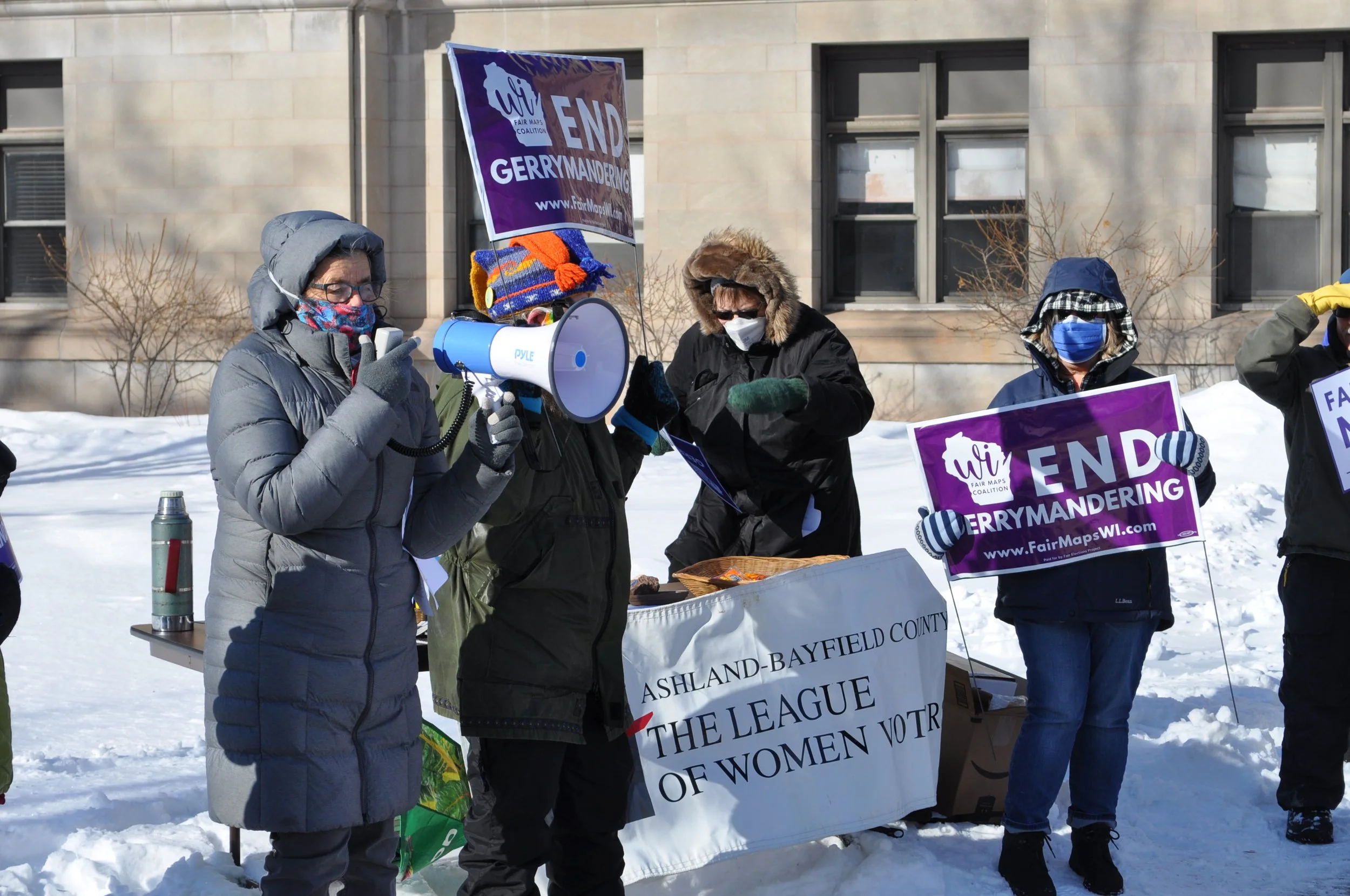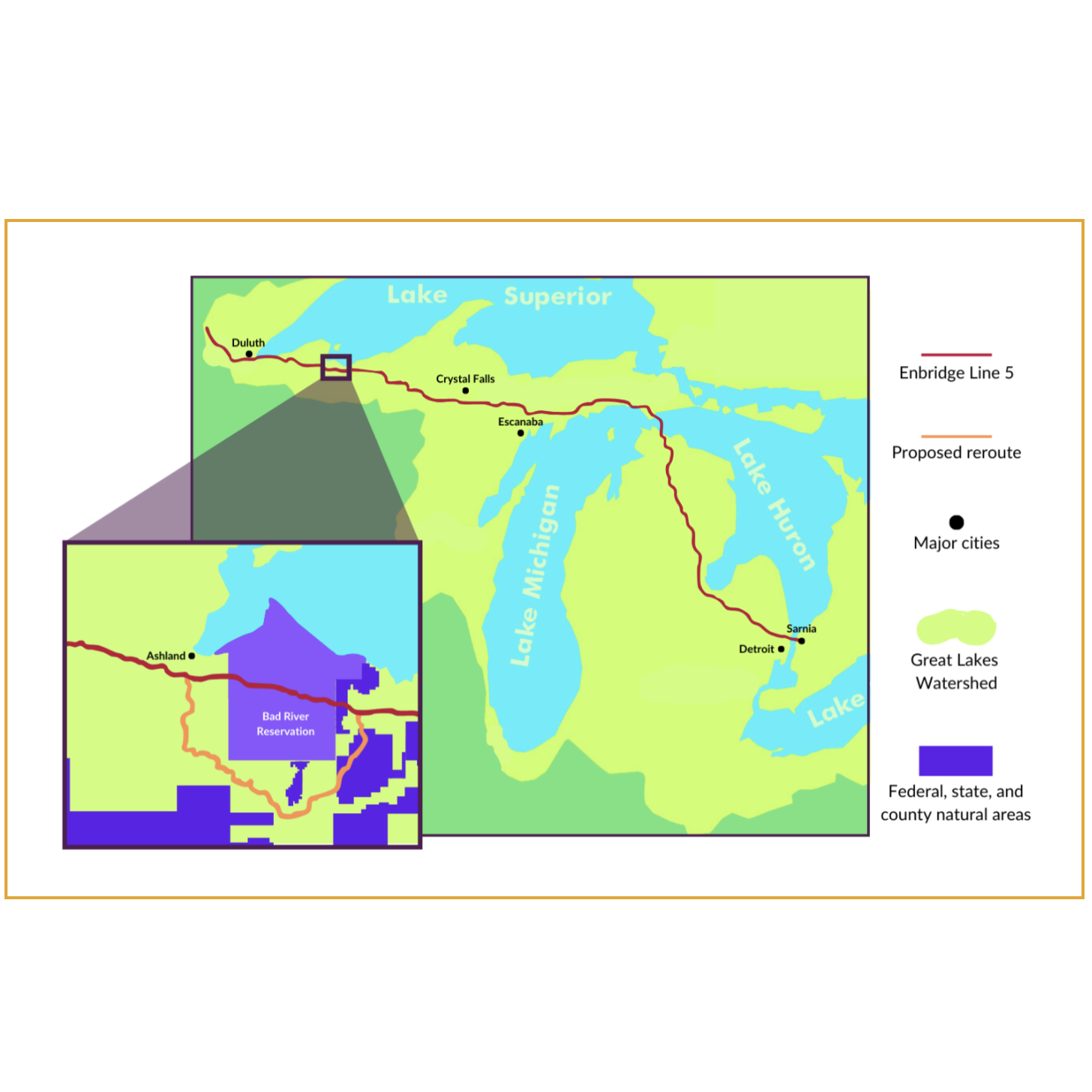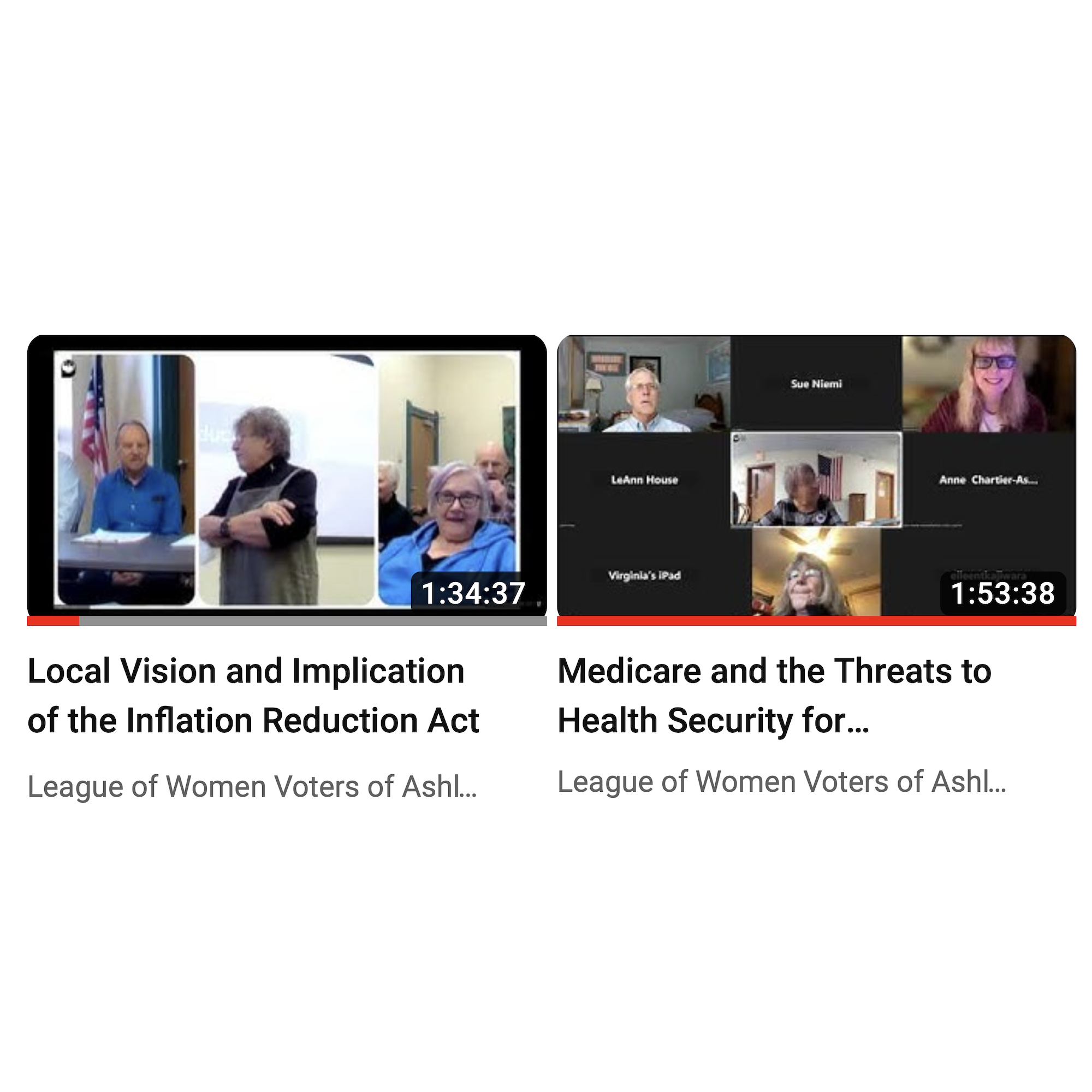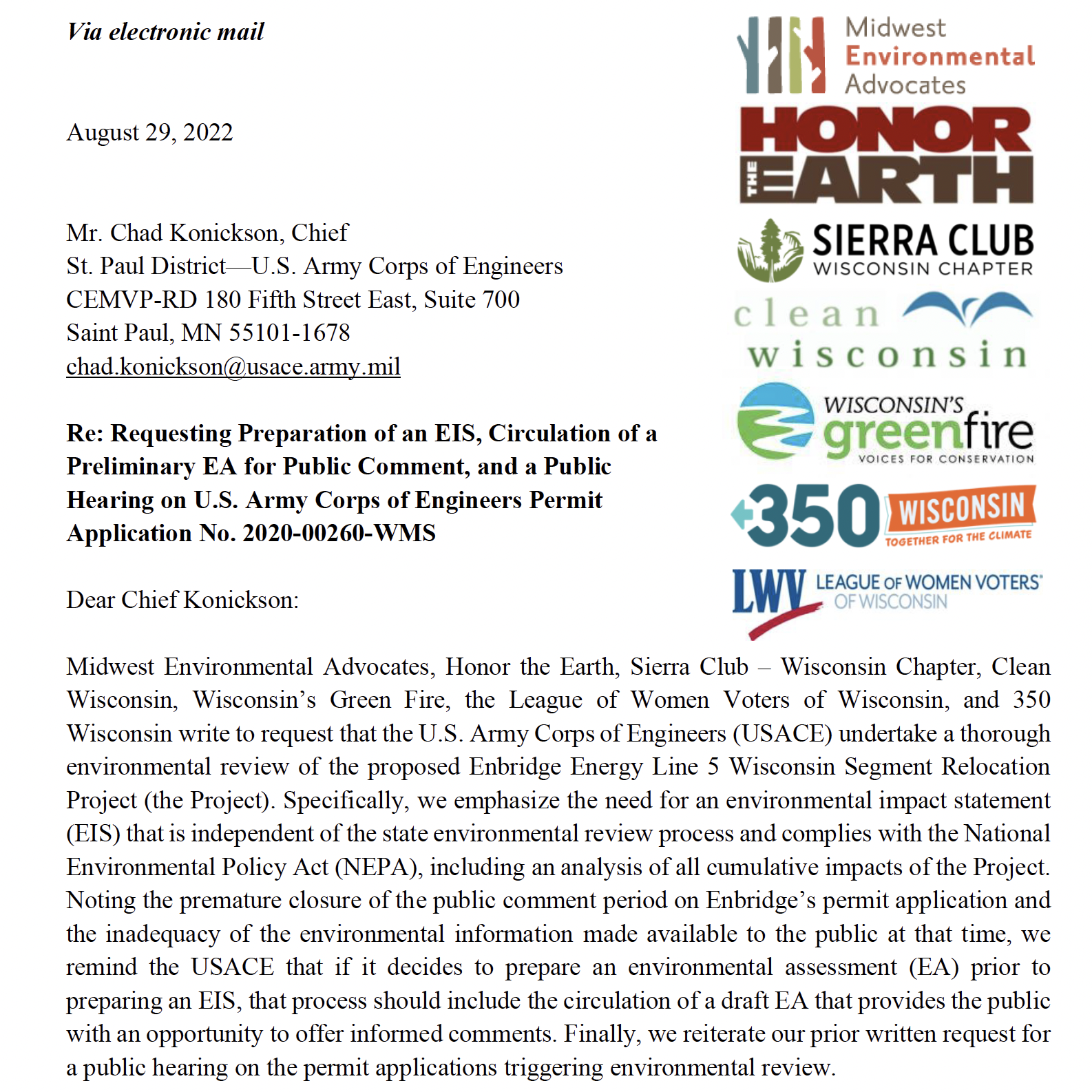Recommendation from Water Position Committee to LWV WI Board
/Below is the recommendation of the LWV WI Water Position Committee to the LWV WI Board preparatory to presentation and voting at the LWV WI Annual Meeting May 31, 2014
Our thanks go out to the LWV/ABC members and board who worked to formulate amendments to the LWV WI Water Position. This issue is of special concern to LWV/ABC because of the threat the proposed taconite mine in the Penokee Hills presents to the waters of Lake Superior and the surrounding region. The changes presented by LWV/ABC addressed mining discharge, local water quality testing, monitoring the transportation of polluting materials, respect for tribal sovereignty, and prevention of aquatic invasive species.
DATE: January 9, 2014
TO: LWV WI Board
From: Elizabeth Wheeler, chair, LWV WI Water Position Committee
Subject: Recommendation from Water Position Committee
The Water Position Committee recommends that the LWV WI Board recommend to the May 31, 2014 Annual Meeting:
(a) adoption of the revised state Water Position (see attached) and
(b) authorization of a Water Education Campaign for 2014-15.
Adoption of revised position: The current LWV WI Water Position is showing its age, and it needed to be rewritten in modern language. During one of the Water Position committee’s teleconference calls, there was agreement that League should advocate for the strongest possible water protection and restoration positions as possible. Water is necessary for life. As we learned while studying energy and global climate change a few years ago, League must look beyond current inadequate public policy and make a clear statement of our intent to deal with the planet’s limited natural resources consistent with League’s values – an informed citizenry participating in public policy that ensures equity for this and future generations.
Authorization of Water Education Campaign: Many local Leagues and even the State Legislative Committee are wondering how the new Lake Michigan LWV Great Lakes Eco-System positions fit into all of League Positions. In addition, the Legislative Committee has not updated Impact on Issues to reflect the recent repeated attacks by the State Legislature on air and water laws. There is a need for presentation of updated Water materials to League members as a refresher of new and existing positions, how they have recently been used and provide a series of educational articles and programs to refresh LWV member understanding of emerging issues. This will provide for an update of Impact on Issues and set the stage for vigorous advocacy.
The Water Position Committee proposes a Water Education Campaign in order to: (a) increase member understanding of how to use League positions and (b) educate members on emerging issues. We believe these objectives can be achieved by preparing study materials, informative articles and videotaped General Meeting programs for local Leagues. A statewide committee would prepare three programs: Great Lakes (Dane County LWV the lead), Fracking (sand mining, oil and gas hydro fracking and Role of Local Governments (possibly in cooperation with Midwest Environmental Advocates) and Groundwater Withdrawals (Elizabeth Wheeler the lead) with possibly a fourth program on Phosphorus (Elizabeth Wheeler and Caryl Terrell the leads). We are confident we can recruit Water Committee members and other Leaguers to write articles for this education campaign.
Submitted on behalf of the Members of the Water Position Committee:
Chair, Elizabeth Wheeler, Dane County League
Karen Isenbrands Brown, Northwoods League
Caryl Terrell, Dane County League
Margy Davey, Winnebago League
Jan Scalpone, Winnebago League
Barbara Gifford, Stevens Point League
Karen Jansen, Appleton League
Don Dahlstrom, Greater Green Bay League
Patricia Finder-Stone, Greater Green Bay League
Helga Guequierre, Great Lakes League
Pat Chung, Milwaukee League
Julie Arneth, Greater Green Bay League
The Proposed Water Position follows:
1-09-2014 final LWV WI Water Position - Proposed to LWV WI May 2014 Convention
Maintaining access to clean water which supports life and a healthy environment is a public trust, a fundamental human right, and is the shared responsibility of all who live or do business in Wisconsin. Managing water as a natural resource is essential to maintaining our quality of life, as well as to ensuring its availability to support the mix of natural flora and fauna which is unique to our state. Decisions about water use and management must be made with consideration for public safety and the impact those decisions will have on all current and future generations of stakeholders.
Water quality and quantity standards need to be addressed in terms of whole basin management and the hydrologic cycle. That is, management not just of the water itself, but of the land and watersheds which drain to wetlands, aquifer, meteoric groundwater, river, lake or other body of water, whether it is naturally occurring or constructed, and wherever it is located. Water management is therefore accomplished as management of all parts of an integrated system within basin boundaries and of any water which may move into or out of that system.
We hold a vision of life where prudent management of water resources leads to sustainable use, where consumption does not exceed the environment’s ability to replenish and to protect itself, and where its quality and quantity is such that all native aquatic species thrive. All current and future generations of stakeholders in Wisconsin shall enjoy the benefits of equal access to natural sources of clean, fresh water.
We support:
Reaffirming the Great Lakes Compact (Wis Stat 281.344-346), which strictly limits unnatural diversions of water from within the Great Lakes Basin. The Great Lakes Compact provides guidelines for mandatory standards of water conservation and efficient water management within the Great Lakes Basin. We support extending these mandatory standards to all waters of the State to prevent ground and surface water depletion.
Water conservation programs that:
- Are based on best practices and sound data
- Prevent depletion of our water resources
- Take into account cumulative impacts of local and regional water use.
Ongoing testing and monitoring for water quality and quantity on state and local levels.
State, local and citizen legal authority to enforce water management standards.
Protecting water quality and quantity through wastewater and stormwater standards and management for both point and non-point sources.
- Adjust cumulative discharge standards for waste and storm water discharges into surface or underground water where effluent levels have been proven toxic.
- Acknowledge that cumulative discharge may come from a combination of sources which include, but are not limited to agricultural, municipal, residential, industrial, commercial, and institutional. (“Agriculture” is understood to be broadly defined to include any agricultural practices including current or emerging technologies.)
- Utilize sustainable practices and green infrastructure that mimic natural hydrologic processes to augment natural processes to control runoff.
2. Work to eliminate all emergency discharges or spills of untreated sewage or waste into the environment that threaten public health and the environment by potentially contaminating sources of clean water for humans, wildlife habitat and fisheries.
- Increase and enforce per incidence fines offending parties are assessed and create fines and funds to restore the negatively impacted environment.
- Decrease stormwater loadings that negatively impact the capacity of wastewater treatment facilities, decreasing the potential for overflows.
3. Provide natural areas where runoff from impermeable surfaces and extreme precipitation events can soak into the soil instead of being released directly into bodies of water or directly into wetlands:
- Promotes replenishment of the hydrologic cycle as well as harvesting of rainwater for immediate uses (such as drinking water, irrigation, and livestock).
- Prevents the loss of limited sources of drinking water by allowing fresh water to follow its natural course of eventually flowing to the ocean.
- Prevents trash, bacteria, phosphorus, heavy metals, pharmaceuticals and other pollutants from unrestricted entry into bodies of water.
4. Protect and enhance the biological integrity of wetlands and other naturally-occurring hydrologic resources that provide water quality, flood protection and habitat benefits.
Sufficient funding for state and federal agencies to monitor water quality and quantity through regular testing, and have a legally defined mandate to act in upholding water standards.
- Establish dedicated revenue sources to provide a dependable source of funding for state water quality programs.
- Revenue sources should have a clear and transparent connection to the use or potential abuse of water, generate sufficient funds to make an impact on water quality and quantity issues, and be easy to collect. Funding options should include:
- General revenue sources because all Wisconsin citizens benefit from adequate water quality and quantity.
- User fees and taxes assessed to activities that affect water quality and quantity.
- Other revenue sources not mentioned may be considered for support if they meet these criteria.

















































































